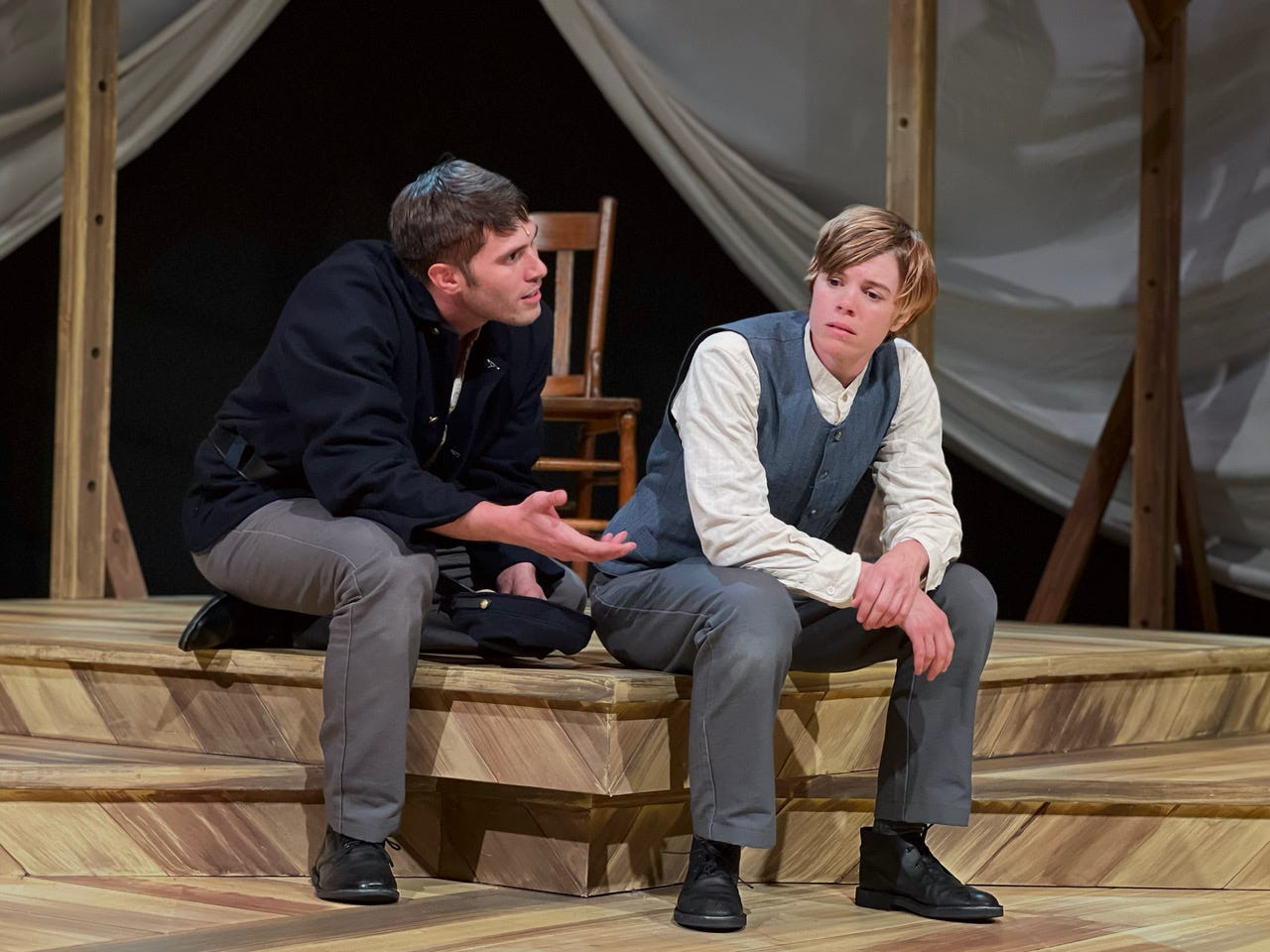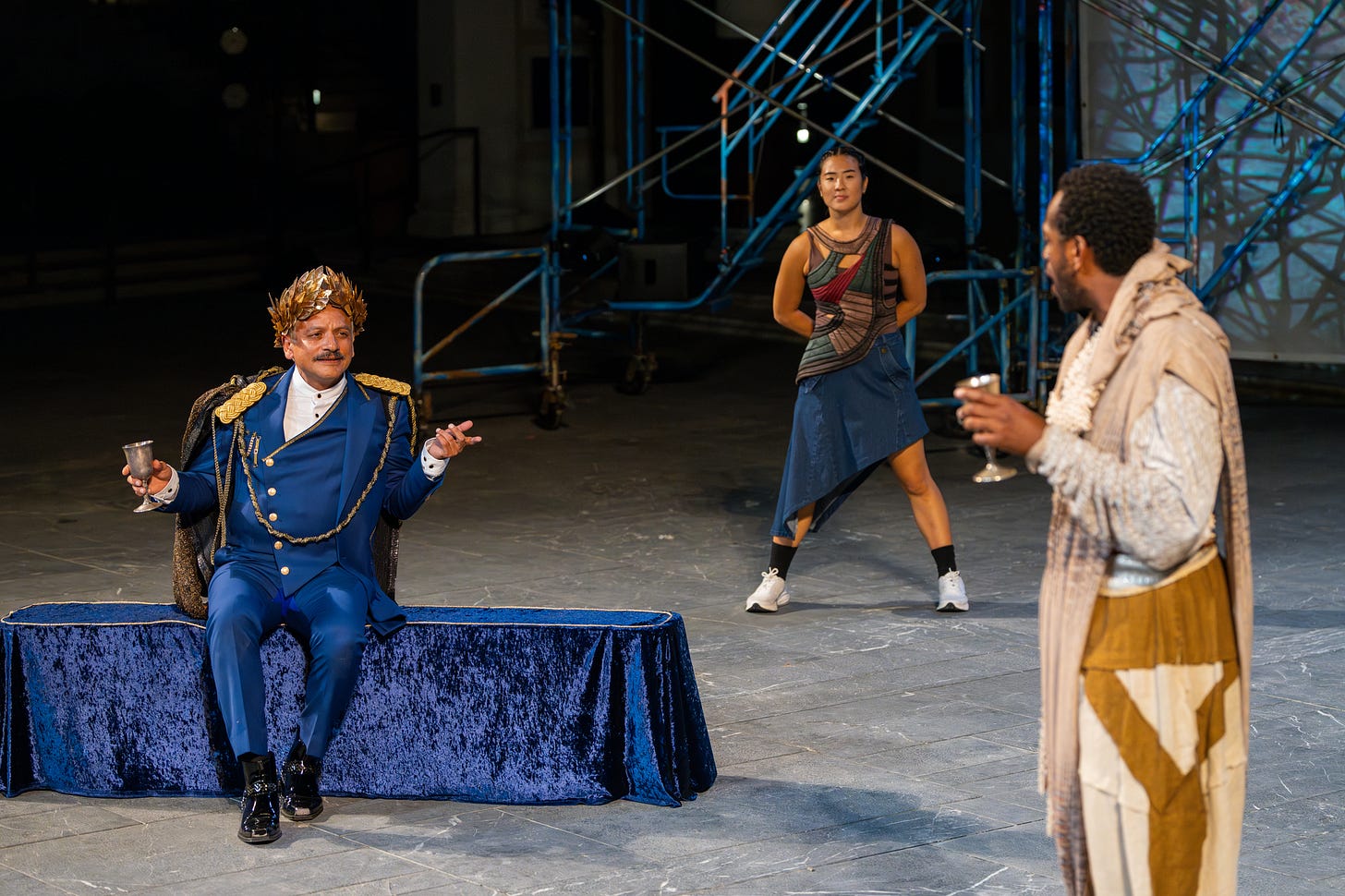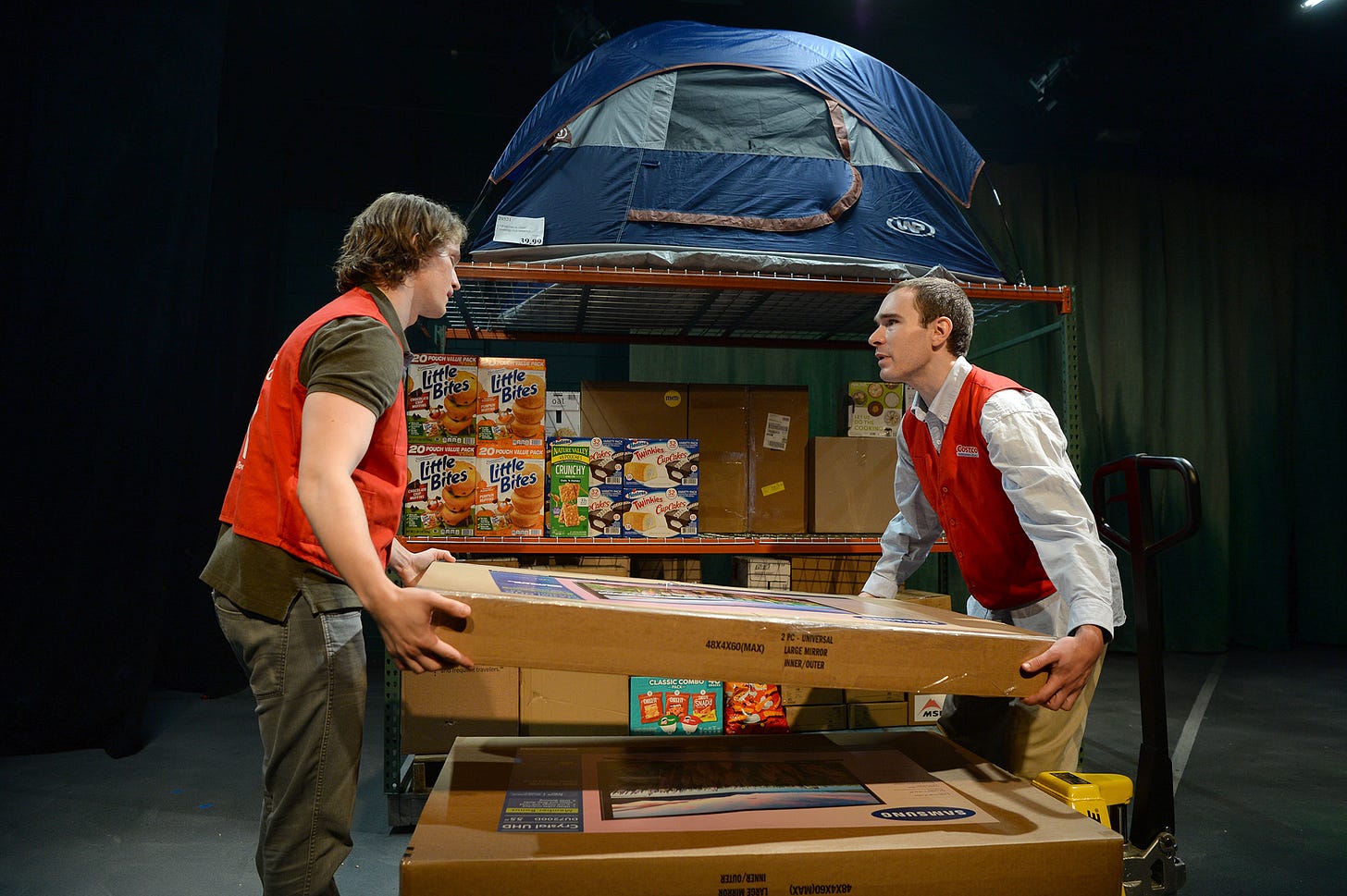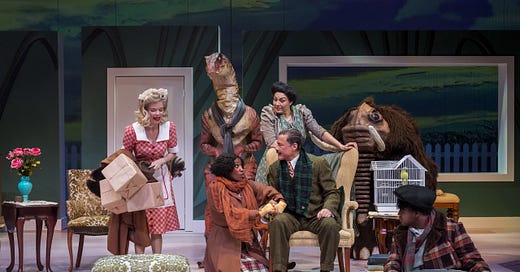Give me some 'Skin', A Noise Within.
'Civility' and 'TH IR DS'. Big-deal duels. A confusing 'Dragon.' 'Clarkston' and 'Kill'

Uh-oh. Thornton Wilder’s cosmic comedy “The Skin of Our Teeth” is bracingly relevant yet again.
“We came through the Depression by the skin of our teeth; one more tight squeeze and where will we be?” Those lines from the play were first spoken in 1942, as World War II was raging on opposite sides of the globe — a war that would end only after atomic bombs killed at least 150,000 people.
But in Wilder’s play, now revived by the classics specialists at A Noise Within in Pasadena, the most immediate threat is that a wall of ice is moving southward through Canada and New York — in the summer, no less — toward the home of the Antrobus family in fictitious Excelsior, New Jersey (Excelsior — “ever upward” —is in fact the state motto of New York).
Of course by 1942 Robert Frost had already noted that the world might end in ice — or it might end in fire. Now, with crystal-clear evidence of climate change causing hotter heat waves, forests in flames, raging floods and rising seas, the latter seems likelier.
Yet one of our two possible next presidents (As a Don/Donald, I can authoritatively report that his first name is pronounced DON-ald, not Don-ALD) has claimed that the climate crisis is a “hoax.” If elected, he vows to “drill, baby, drill” without paying any attention to the devastating downsides. As the LA Times recently reported, he’s also trying to sell lots next to his Rancho Palos Verdes golf course, even as the adjacent land is gradually sliding toward the ocean, and even after the course’s previous 18th hole is already underwater.
Yes, the USA and the planet are facing multiple “tight squeezes” right now. Substitute “heat wave” for “ice flow,” and the first act of “The Skin of Our Teeth” might have been written in 2024. Likewise, since 1942 warmer oceans have resulted in an increase in the number of major hurricanes, like the one that strikes Atlantic City in the play’s second act.
Directors Julia Rodriguez-Elliott and Geoff Elliott don’t call particular attention to this old play’s extraordinary topicality in 2024. Yet “Skin” is a clarion call for combating today’s dangers. Of course it’s also the bitingly satirical allegory about the struggles of humanity that it has been since 1942. In fact, it might well be the funniest production on LA stages right now.
The cast is led by the protean Ann Noble (temporarily interrupting her run as Leni Riefenstahl in “Crevasse”) as the household maid Sabina, and Frederick Stuart and Trisha Miller as Mr. and Mrs. Antrobus (the family name is derived from the Greek “anthropus” — “human” or “person”). The Antrobus children are Henry (Christian Henley), whose Cain-like incident with his unseen brother is something they would rather not discuss, and Gladys (Mildred Marie Langford), who in the third act emerges from the air raid shelter after a war with a baby in her arms.
The main narrative sometimes turns into a play-within-the-play. A “Stage Manager” (Kasey Mahaffy) eventually appears on stage. Sabina’s sassier lines include doses of, well, theater criticism about the puzzlements of the fictional play that Noble’s Sabina is performing. A few of the lines have been updated and personalized with references to the actual experiences of A Noise Within’s actors, but not at the expense of the power of the original script.
The production is also blessed with the creations of designers Frederica Nascimento, Garry Lennon, Ken Booth, Robert Oriol and Nicholas Santiago, plus “woolly mammoth puppet fabricator” Kelsey Kato.
I might be somewhat personally invested in this play because I played the Telegraph Boy (a short role, performed here by ensemble member Jacob Cherry) in an amateur production decades ago. But now it seems even more obvious that Wilder’s plays hold up much better than the more realistic work of Eugene O’Neill, who was long regarded as the most important American playwright before the post-war generation (Arthur Miller/Tennessee Williams, etc.). “The Skin of Our Teeth” is as resilient as the Antrobuses themselves.
‘Civil’ secessions and cessations
Two noteworthy productions are currently referencing the most obvious point in American history when the nation was even more divided than it is right now — the Civil War and its lingering effects.

“The Civility of Albert Cashier,” at the Colony Theatre in Burbank (through this weekend), is a musical about a real-life Irish immigrant, who had been given the name Jennie Hodgers at birth. But “Jennie” enlisted in the Union Army as Albert Cashier, fought in the war and then continued living as a man for decades. Jay Paul Deratany’s script moves back and forth between young Albert, who managed to get through the war without anyone discovering his female anatomy, and old Albert, whose hospitalization finally revealed his biological secret. This ultimately resulted in an investigation of fraud by the veterans’ pension board — which was dropped after fellow comrades from his regiment testified on his behalf.
A lively, folksy score by Coyote Joe Stevens and Keaton Wooden (with some of the lyrics by Deratany), a five-piece band and Richard Israel’s staging keep the story moving at a comfortable clip. We gradually appreciate, without any overt signaling, how the recent trans rights movement connects to the more familiar human rights issues that were being contested in the war. Dani Shay plays Young Albert, but I saw a capable understudy, Gabby Dahlen, in that role. Cidny Bullens plays old Albert. The supporting cast, with six Actors’ Equity members, is smoothly professional.
“TH IR DS,” at the smaller Zephyr Theatre on Melrose Avenue, is a fascinating what-if scenario. What if Lincoln — to avert war and save lives — had let the Confederacy separate? And what if later the Western states formed the autonomous Pacific States of America, so that three separate countries occupy what is now the USA (with Confederate slavery ending around the 1890s — although how that happened isn’t spelled out)?
Now, in 2024, the PSA is arranging to build a much-needed water pipeline into the previously hostile CSA, which is wallowing in violence and poverty — mostly depicted in video scenes that intermittently interrupt the live action.
In the live-staged scenes, a Jewish Californian (playwright Ben Edlin) and a Korean-Confederamerican (Steven Choi) are on the verge of completing the negotiations about the pipeline. Each of them is also absent from about-to-deliver pregnant wives, which leads to some bonding despite a few sharp exchanges about the respective countries. Each also has a shadowy, more powerful figure behind him.
The script (story by Deborah Aquila and Edlin) has its holes and “huh?”s (for example, a Nobel Prize has been announced for something that hasn’t yet been achieved). We don’t hear much about the northeastern Union. But I was stimulated by Aquila’s and Edlin’s narrative ambitions, and the performances — on video as well as in the theater — are solid.
Dueling dramas
Three productions at big-deal theaters feature the act of dueling, if we stretch that word to its limits. I can’t say that any of them definitely wins the duels among the three contending spectacles.

“Memnon,” Getty Villa’s annual outdoor production, is certainly enterprising. It’s the first new, commissioned play in the Getty’s alfresco series. Previous scripts were adaptations or at least translations of existing Greco-Roman classics (although LA’s Troubadour Theater strayed quite far from the originals in such works as “Haunted House Party” and “Lizastrata).” The Classical Theatre of Harlem co-produces this premiere, and that company’s associate artistic director Carl Cofield co-conceived and directed it.
The playwright is Will Power, whose “Fetch Clay, Make Man” depicted Cassius Clay and Stepin Fetchit at Center Theatre Group’s Kirk Douglas Theatre last year. Memnon (Eric Berryman) was a legendary Ethiopian warrior, not nearly as well known to us as Clay/Muhammad Ali or Fetchit. Don’t confuse him with the better-known Greek king Agamemnon. Memnon is related to the Trojans, who recruit him to help defeat the Greeks after Achilles kills the Trojan prince Hector. No ancient play primarily about Memnon survives.
Actually, even Power’s play sometimes seems less interested in Memnon himself than in the events that engage him. Charles McNulty explored this in greater detail in his LA Times review. Like McNulty, I would have appreciated knowing more about Memnon.
The Pasadena Playhouse is presenting a revival of Edmond Rostand’s “Cyrano de Bergerac,” the 1897 play about a 17th-century French man (Chukwudi Iwuji) — yes, a duelist, as well as an articulate speaker and writer — who pens elaborate love letters to Roxane (Rosa Salazar) on behalf of a tongue-tied friend (Will Hochman), even though Cyrano himself is secretly drawn to Roxane. Adapter Martin Crimp probably was aware that all of this might sound somewhat musty to many of today’s theatergoers, so he updated the vocabulary in his English adaptation. And Mike Donahue, the director of the Pasadena version, adopted the modernized concept of the original UK and NYC versions of Crimp’s adaptation — contemporary costumes and open sets, vividly lit.
Still, the play remains dusty, if not musty, and it’s too long (as opposed to the title character’s nose, at least in this production). The whole concept of a contemporary revival of this material, without more extensive rewriting of its narrative, is perplexing.
Finally, the Ahmanson Theatre at the Music Center is currently presenting (through this weekend) “Duel Reality,” in which cirque-style acrobats occasionally — and unfortunately — combine their onstage feats with a limp evocation of the plot of “Romeo and Juliet,” suggested in words as well as movement. A touring production from the Montreal-based 7 Fingers troupe, “Duel Reality” is at its best when the acrobats demonstrate the importance of precise cooperation, as opposed to any sense of “dueling.”
Featuring Filipina-Americans
Currently occupying the larger space at the Geffen Playhouse is Sara Porkalob’s “Dragon Lady,” in which Porkalob — all by herself — portrays 19 characters from her Filipino-American family, seven of whom appear at more than one age. It’s difficult to keep track of who’s who and at what age. I suppose the production saves money by employing no other actors — although because Porkalob sings some of the material (quite well), the payroll does include three onstage musicians. While the script has far too many characters, it also has some significant narrative gaps. But then this is apparently “Part 1” of a proposed trilogy. (In the playhouse’s smaller space, the Geffen’s new artistic director Tarell Alvin McCraney opened his first season with a vigorous revival of his own play “The Brothers Size”, but it closed on September 8.)
Meanwhile, in the mid-size Theatre 2 at downtown Los Angeles Theatre Center, Artists at Play and LATC are presenting Nicholas Pilapil’s “God Will Do the Rest,” a cliched family comedy/drama, formulaic except for the fact that the family is Filipino-American (and perhaps also that the casting includes one performance in drag). Fran de Leon’s staging has one of those artificial family-dinner scenes in which the large family is sitting on only one side of a long table so that the audience can see all of their faces — never a good sign. On the upside, at least the play is local — it’s plainly designated as occurring in Cerritos, about 20 miles southeast of LATC.
And in smaller venues…

Speaking of location, location, location, Samuel D. Hunter wrote two plays named after and situated in towns across the Snake River from each other — “Clarkston,” set in Clarkston, Washington — and “Lewiston,” set in the somewhat larger Lewiston, Idaho. They’re sometimes produced as a package, but only “Clarkston” is being introduced to LA by Echo Theater Company in Atwater, minus “Lewiston.”
“Clarkston” is a powerful portrait of two twentysomething Costco night-shift workers from very different backgrounds, feeling stifled and trying to find solace wherever they can. One of them (Michael Sturgis) is a well-educated Lewis and Clark devotee, recently arrived from back east, with a serious medical condition. The other (Sean Luc Rogers) is a local who doesn’t think much of Lewis and Clark but has a family obligation that makes him feel trapped. Director Chris Fields and his cast hit every rueful note of irony and regret with Chekhovian precision (although the notes of the Stephen Stills song “4+20,” while appropriate for the mood, are repeated too often in between scenes).
Another highlight of the current small-theater scene is “Kill Move Paradise,” at Odyssey Theatre in West LA. After violent deaths, three young Black men and one younger adolescent fall, one by one, into a bleak waiting room between life and death, where they can see us watching them as they await…?
This is an early work from playwright James Ijames, whose “Fat Ham” was one of the highlights of the year last spring, at the Geffen. “Kill Move Paradise” is a more abstract, ritualistic script, almost absurdist, but it accumulates emotional power under the steady hand of director Gregg T. Daniel. The ensemble includes Ulato Sam, Jonathan P. Sims, Ahkei Togun, and Cedric Joe, whose character was inspired by the case of Tamir Rice, the 12-year-old who was killed by a police officer while wielding a toy gun in a Cleveland park. Set designer Stephanie Kerley Schwartz, choreographer Toran Xavier Moore and lighting designer Donny Jackson are essential collaborators.


